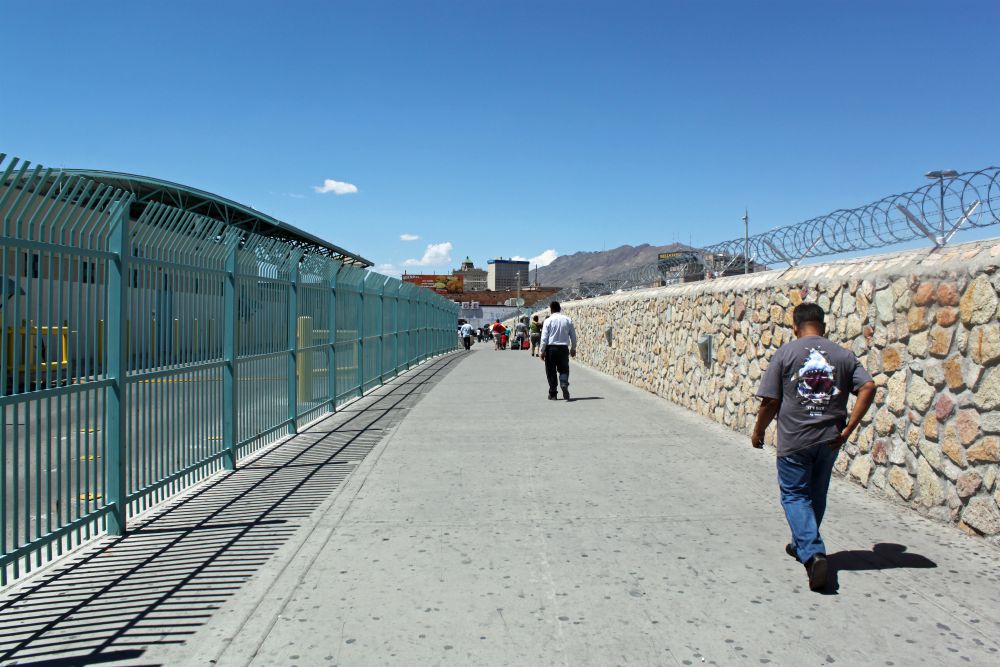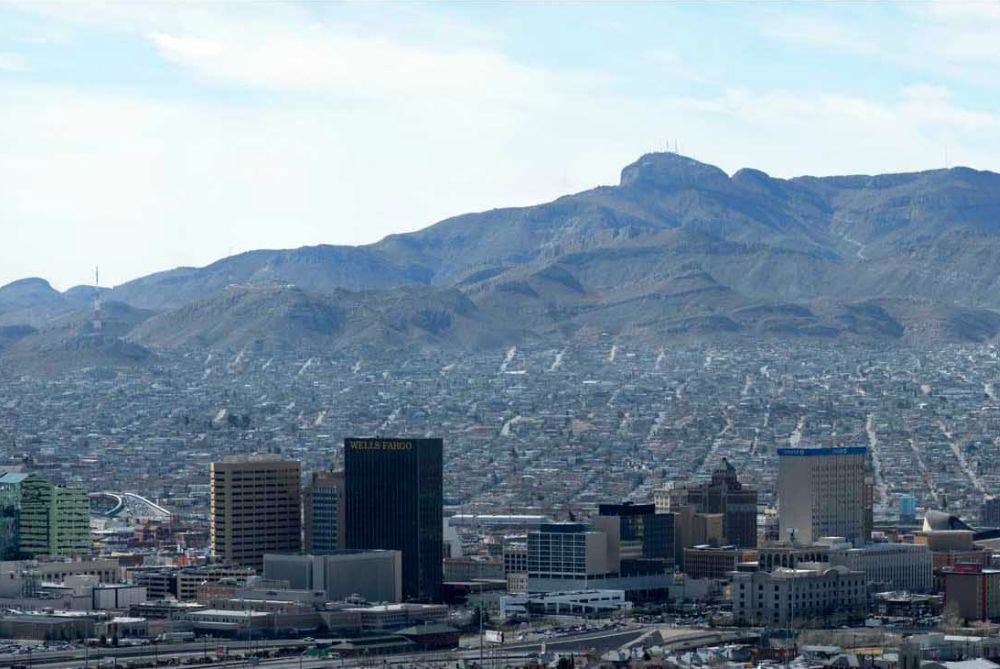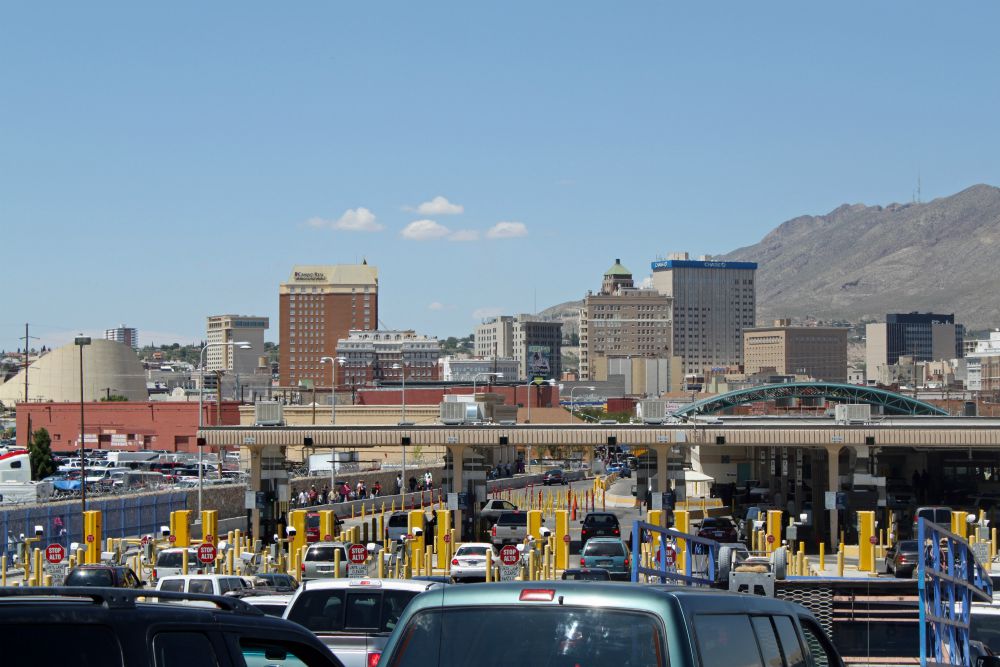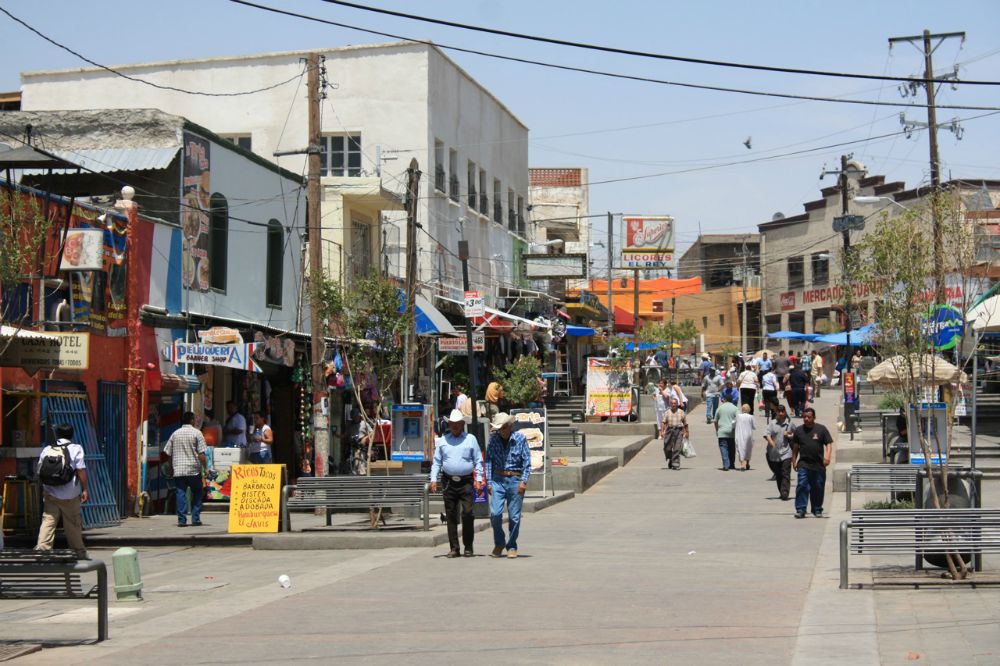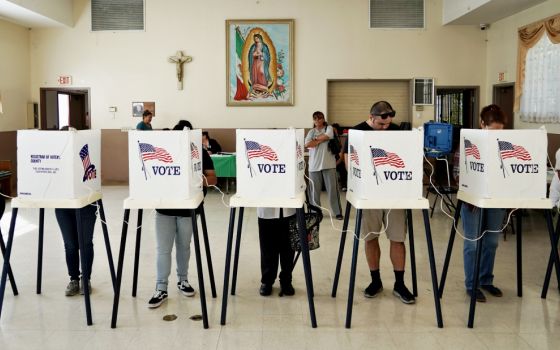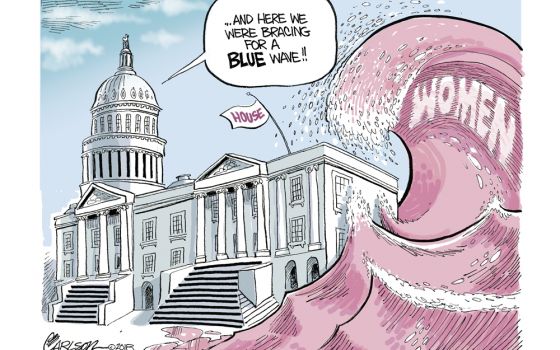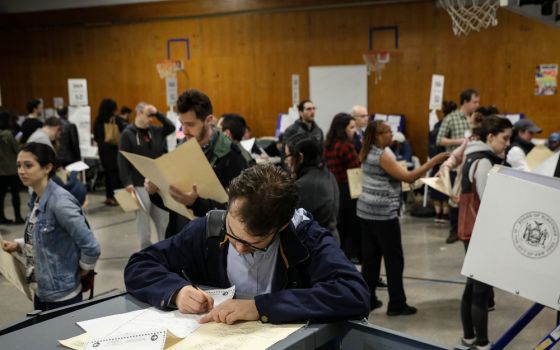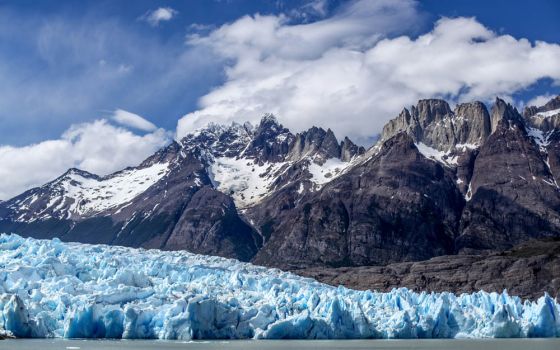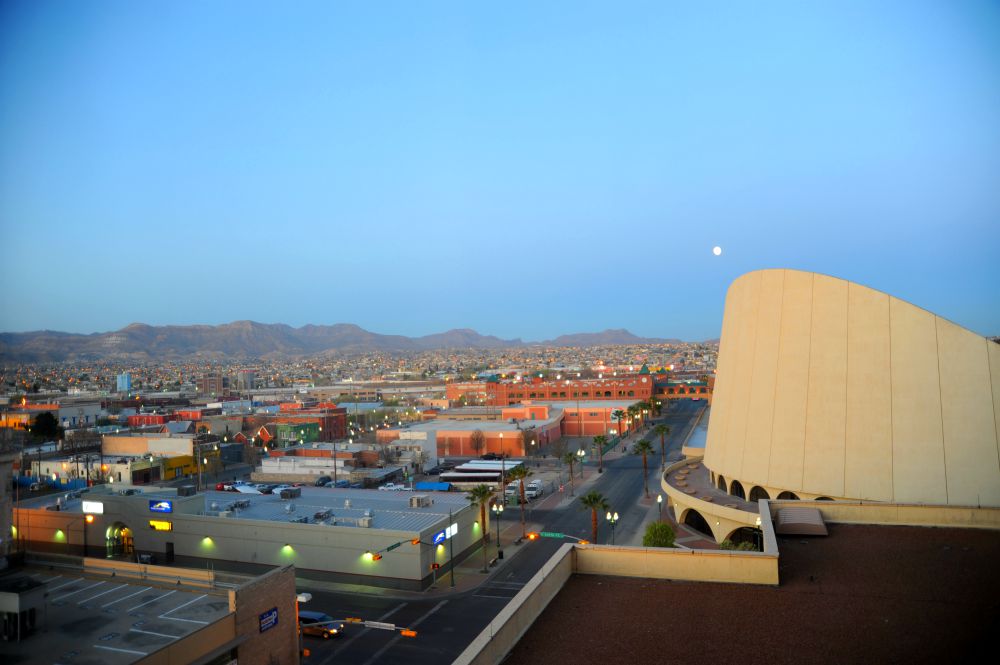
San Antonio Ave, El Paso, Texas, 2009, showing the Abraham Chavez Theater (Flickr/Andrew Poth)
When people living on the U.S.-Mexico border hear their home described in immigration policy discussions, it sounds like a wasteland, a warzone or even another planet.
But many residents of El Paso — a West Texas town of about 700,000 that blends so seamlessly into neighboring Ciudad Juárez, Mexico, that the sister cities can't be distinguished from the air — told NCR that they don't recognize their home in these negative descriptors.
They wonder what would happen to national migration policy if decision-makers, commentators and voters who operate on assumptions about what happens at the border actually understood their reality.
Most people "see a border as a place of no return, a no-man's-land, a place where one reality ends and another begins, but for us a border is so different," said El Paso Bishop Mark Seitz. "For us it's a place of passage, it's a place of encounter, it's a place you cross in order to join your family; it's not this place of armies confronting one another … We have a different understanding of what a border is and should be."
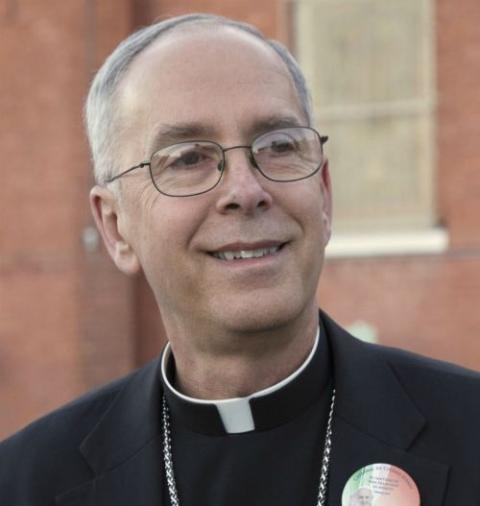
Bishop Mark Seitz of El Paso, Texas, 2016 (CNS/Nancy Wiechec)
"It's not an empty space. It's not a hypothetical either," said Edith Tapia, policy research analyst at the Hope Border Institute. "We have very unique circumstances, but we make the best of what we have … Sharing that with people from the outside has always been a shock because they imagine the border to be this empty land. They come here and are like, 'I didn't realize it was big. I didn't realize it was a city.' … It's like Mars, almost, to a lot of people."
"We are a community," she said. "A community that has to live through a lot of challenges, where policies play out in a very real way, yet there's a lot of things that we celebrate, and I think that we take pride in that as well."
When Fr. Marcus McFadin, pastor of St. Luke Catholic Church, hosted a conference in El Paso in early 2017, he had to reassure potential participants that they wouldn't be in danger if they attended.
"The violence [in neighboring Juárez] has really gone down, but that's all that people had in their mind, that they were coming to El Paso, to this dangerous, dangerous place," he told NCR. To promote the conference, he had to constantly emphasize that El Paso is among the safest cities in the nation. "People just don't really understand life here and they live off the stereotypes of what actually goes on."
McFadin is likely referring to rankings based on FBI data on crime that is interpreted by CQ Press each year and which consistently shows that El Paso has among the lowest violent crime rates of any large city.
Advertisement
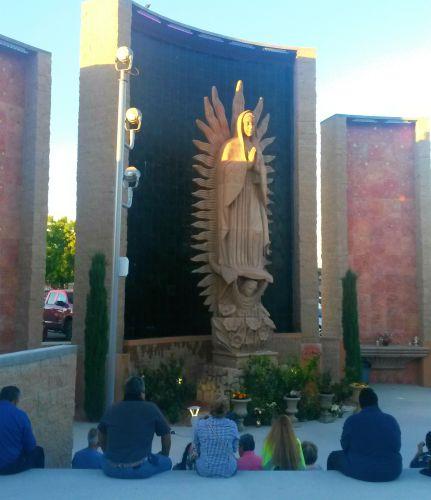
People say the rosary near a fountain representing the Virgin Mary at St. Mark Catholic Church in El Paso, Texas, Sept. 17. (NCR photo/Maria Benevento)
Although both the FBI and CQ Press caution against using the data to label cities as safe or dangerous, the rankings are still a point of pride in El Paso and are often mentioned to challenge outsiders' perceptions of the city; even signs in the airport welcome arriving travelers with the announcement that they have reached the safest city in Texas.
Beto O'Rourke, the Democratic Senate candidate for Texas who hails from El Paso, has repeated the same claim since announcing his candidacy in early 2017, also emphasizing that safety rankings in the top three nationally have been the norm for El Paso since 1997, before increased border militarization.
Ruben Garcia, founder and director of Annunciation House, which shelters migrants in El Paso, closes immersion trips for Loyola University Chicago students by offering "asylum" to anyone who would like to seek refuge in the relative safety of El Paso rather than returning home, a concept that wouldn't make sense to those who never visit and don't have time to become deeply informed.
"They hear the mantra it's dangerous, it's dangerous. They're all criminals. They're murderers and rapists. They're coming to take your jobs. They're coming," Garcia said.
According to Garcia, increased border security doesn't primarily benefit El Pasoans, many of whom aren't afraid of Mexico and are inconvenienced by security measures as they legally cross back and forth between El Paso and Ciudad Juárez.
"It's for you," he said, addressing the rest of the nation. "We do this because you're the one that's scared. You're the one that's afraid to walk over to Juárez. You're afraid that Donald Trump's correct that we're murderers and rapists. … We have to bear the brunt to meet your expectations."
"I think people in El Paso really would like to see an open ability to interact with each other," he added, pointing out that migration is a natural phenomenon that he doesn't believe should be restricted.
Like Garcia, McFadin described borders as artificial. "It's a man-created thing for power and domination, to control," he said. "People for centuries just walked back and forth." He added that during national conversations about immigration "none of those people ever really come here to see it for themselves. They'd rather listen to their local commentary than see the reality."
Actually visiting the border and volunteering in a shelter for migrants sometimes shakes people's perceptions and even changes their political positions, said Seitz, who suggested that those who can't travel to the border at least take the time to meet an immigrant.
"Ask them why they left. Don't just let politicians tell you why they left — 'They're coming to take advantage of our taxes' or something like that. That's not the reason. Those are hardworking people. The vast, vast majority of them who just want to survive. Get to know them. You'll come away with a different understanding."
"I'd like the rest of the country to know that these are human beings that are crossing the border … That their babies cry when they don't have food, and they feel lost when they don't have shelter, and they feel anxious for their families when they are incarcerated," Seitz said. "These are human beings. And they are our brothers and sisters, and there's no way to define them out of that."
Sometimes this family connection is more than metaphorical, as many El Pasoans either have family in Mexico or have close relatives who have immigrated.
"The hardest thing for people who are not on the border to recognize" is the level of interaction between the U.S. and Mexico along the border, including commerce, people crossing daily for work, and family relationships, said Richard Pineda, a professor of communications for the University of Texas at El Paso.
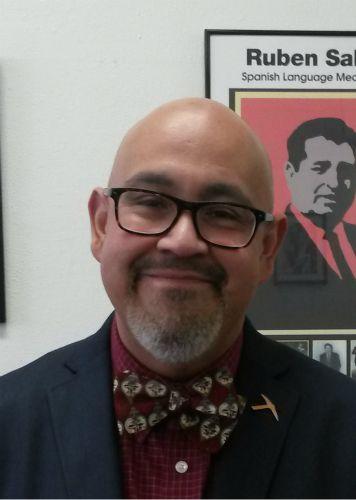
Richard Pineda, a professor of communications for the University of Texas at El Paso (NCR photo/Maria Benevento)
"Whenever there are conversations at the national level about policies related to immigration, I think virtually everyone on the border, regardless of partisan belief, is a little disappointed and little bit shocked by how tone-deaf some of that conversation can be."
For those not on the border, "the sensibility of big fences, lockdown and high security" sounds appealing, Pineda said, but "when you live on the border, you realize that those things are already here ... there's a huge difference between policies being debated and discussed in Washington versus what we're seeing on the ground."
That's the experience of Mariza Mendoza, the youngest member of the #AquíEstamos voter registration group at St. Mark Catholic Church, who grew up in a close family with parents from Mexico.
"Other cities don't know the level of care between people in El Paso and people in Mexico. We're a community of Hispanics. People on the other side don't contribute physically, but we are always united," she said. " … It fills me with love to see the people there even if they don't have citizenship."
[Maria Benevento is an NCR Bertelsen intern. Her email address is mbenevento@ncronline.org.]

